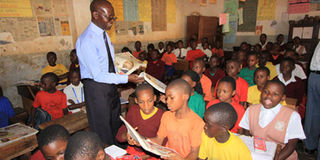Only 30% pupils to sit for this year’s PLE

Schools like Buganda Road Primary School in Kampala have a big advantage over many others that often do not retain the children who join P1. Many in the countryside have skeletal classes by P7. Photo by Ismail Kezaala.
What you need to know:
Schools have been faulted for inflating enrolment figures, some by as much as 300 per cent. Many explain they need the money to meet critical needs.
More than half of the pupils who enrolled in Primary One seven years ago will not sit Primary Leaving Examinations after they failed to make it to Primary Seven.
According to Ministry of Education statistics, 1,763, 284 pupils registered in P1 in 2006 across the country but have since dropped to 564, 804 candidates who registered with Uganda National Examinations Board this year to sit exams due on November 5 and 6.
This means 68 per cent of the pupils who enrolled have either dropped out of school, married early, died or repeated some classes along the way.
Admission of the problem
Dr Daniel Nkaada, commissioner primary education, says the government needs to do a scientific research to ascertain where pupils who join school go before completing Primary Seven, the last level of primary education.
“We must admit that completion rate is very low. There is no scientific research on why many pupils don’t make it to P7. It is just a hypothesis. Some schools don’t register candidates at P7 because they have not been performing well and the school wants to keep good records,” Dr Nkaada said in an interview.
Searching for solutions
The Judicial Commission into the mismanagement of universal education funds found out that many schools inflate enrollment figures in order to get a lot of money.
The report notes that the number of ghost pupils is highest in P1 and lowest in P7. This means that the government could be spending big sums of money on absent P1s.
For instance, at Aripea PS in Arua District, the commission head counted 35 pupils present in 2010 out of the 1, 905 the school had officially recorded.
According to the Justice Ezekiel Muhanguzi-led report, the head teacher conceded the variation but said that the school “inflates the enrollment in order to have money to meet the necessities of the school like construction of latrines.”
Ms Margret Rwabushaija, Uganda National Teachers Union chairperson believes universal education has been politicised with stakeholders using it to attain selfish goals. For example, she explains that while parents are expected to provide lunch for their children while at school, some politicians have used this opportunity to mislead the public saying it is the responsibility of the government.
As a result, some parents have failed to provide for their children forcing many to dropout because they can’t study on an empty stomach.
“The completion rate is very low at 24 per cent. Where are the rest of the children? The education act allows parents to participate but this has been politicized in some cases head teachers dismissed. Failure of the government to allow parents give food to children has led to 90 per cent either leave school or study hungry,” Ms Rwabushaija told Daily Monitor.
| Year of registration | Number of registered pupils | Year of completion | No of pupils who sat (P7) | % Dropout |
| 2001 | 1,704,766 | 2007 | 470,272 | 72 |
| 2002 | 1,847,160 | 2008 | 515,729 | 72 |
| 2003 | 1,914,893 | 2009 | 509,640 | 73 |
| 2004 | 1,837,277 | 2010 | 544,531 | 70 |
| 2005 | 1,712,420 | 2011 | 535,933 | 69 |
| 2006 | 1,763,284 | 2012 | 564,804 | 68 |




